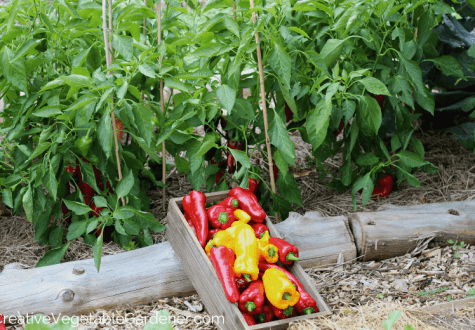Best Fertilizers for Peppers: Increase Development and Taste Naturally
Best Fertilizers for Peppers: Increase Development and Taste Naturally
Blog Article
Exactly How Plant Foods Play an Essential Role in Growing Healthy And Balanced and Plentiful Pepper Crops
Fertilizers offer as the foundation of successful pepper growing, providing a calculated strategy to nourishing the soil and cultivating ideal plant development. The intricate dancing between crucial nutrients and the pepper plants' physiological procedures highlights the critical duty that plant foods play in making sure a bountiful harvest.
Relevance of Nutrient-Rich Plant Foods
The utilization of nutrient-rich fertilizers plays a crucial function in boosting the productivity and top quality of pepper crops in contemporary farming methods. Nitrogen, potassium, and phosphorus are main nutrients that are crucial for the development and growth of pepper plants.
Inadequate levels of these nutrients can bring about stunted growth, lowered yields, and vulnerability to illness (best fertilizers for peppers). Nutrient-rich fertilizers supply a targeted service to ensure that pepper plants get the necessary components for optimal growth and performance. Additionally, these fertilizers help enhance soil fertility with time, producing a sustainable atmosphere for long-lasting pepper cultivation
Enhancing Plant Growth and Development
To maximize plant growth and growth in pepper crops, strategic application of nutrient-rich plant foods is important. Fertilizers play a critical duty in boosting the overall health and wellness and performance of pepper plants by offering them with important nutrients that might be doing not have in the dirt. Nitrogen, potassium, and phosphorus are main macronutrients needed in big quantities by peppers for robust growth. Nitrogen help in leafed eco-friendly development and total plant vigor, phosphorus sustains origin growth and blossom development, while potassium adds to illness resistance and fruit quality.
Along with these macronutrients, micronutrients such as magnesium, zinc, and iron are likewise vital for the appropriate performance of various plant procedures. Iron, for example, is needed for chlorophyll production, which is necessary for photosynthesis and general plant development. Zinc plays an essential duty in enzyme activity and hormonal agent synthesis, affecting plant development and advancement at a mobile degree. Magnesium is crucial for the development of chlorophyll and total power transfer within the plant.

Boosting Disease Resistance With Fertilizers
By tactically integrating targeted fertilizers, farmers can bolster the disease resistance of pepper plants, making sure ideal plant health and wellness and performance. Plant foods consisting of crucial nutrients like phosphorus, potassium, and nitrogen play a crucial function in strengthening pepper plants' immune systems, making them extra resistant to numerous illness.

Optimizing Pepper Yield Via Fertilizing
Using a balanced fertilization method is essential to accomplishing maximum pepper yield and making sure optimum plant efficiency. By supplying peppers with the appropriate nutrients at the best time, farmers can considerably improve their yield capacity. Nitrogen, phosphorus, important link and potassium are vital aspects for pepper development, with nitrogen assisting in fallen leave and stem advancement, phosphorus supporting root development and flower formation, and potassium advertising total plant health and wellness.
To make best use of pepper yield, it is vital to perform soil examinations to identify existing vitamins and mineral degrees and determine any kind of shortages that require to be attended to. Based on these results, farmers can create a customized fertilization strategy that fulfills the particular demands of their pepper crops. Furthermore, correct fertilization methods such as split applications throughout the expanding season can make certain constant vitamins and mineral accessibility for the plants.

Sustainable Fertilizer Practices for Peppers
In thinking about lasting fertilizer techniques for peppers, it is imperative to concentrate on long-term dirt health and ecological stewardship in conjunction with making the most of crop productivity. Sustainable plant food methods aim to boost or maintain soil fertility while minimizing damaging environmental impacts. One vital technique is using organic fertilizers such as compost, manure, or cover crops, which not only provide essential nutrients to the peppers however additionally add to dirt framework and microbial task. These natural choices assist develop organic matter in the soil, enhancing its capacity to maintain water and nutrients, therefore sustaining lasting plant health and durability.
In addition, accuracy agriculture strategies, such as soil testing and targeted nutrient applications, can assist enhance plant food usage, making certain that peppers receive the nutrients they need without excess drainage right into waterways. This not only benefits the environment by minimizing contamination however also redirected here saves expenses for farmers by decreasing waste. By taking on sustainable plant food practices, pepper farmers can safeguard the health of their plants, dirt, and surrounding communities for future generations.
Verdict
In conclusion, fertilizers are important for cultivating healthy and balanced and plentiful pepper plants. best fertilizers for peppers. They supply necessary nutrients for plant growth and growth, boost condition resistance, and take full advantage of return. By carrying out sustainable plant food practices, farmers can make sure the long-term wellness of their pepper crops and add useful content to a much more environmentally-friendly and reliable farming system
The intricate dancing between important nutrients and the pepper plants' physiological procedures highlights the critical role that fertilizers play in guaranteeing a plentiful harvest.To enhance plant growth and development in pepper plants, strategic application of nutrient-rich fertilizers is important. Fertilizers play a vital duty in improving the overall wellness and performance of pepper plants by giving them with crucial nutrients that might be lacking in the dirt.By purposefully including targeted fertilizers, farmers can reinforce the disease resistance of pepper crops, guaranteeing ideal plant wellness and productivity. Fertilizers containing important nutrients like phosphorus, potassium, and nitrogen play a crucial duty in reinforcing pepper plants' immune systems, making them much more resilient to various diseases.
Report this page